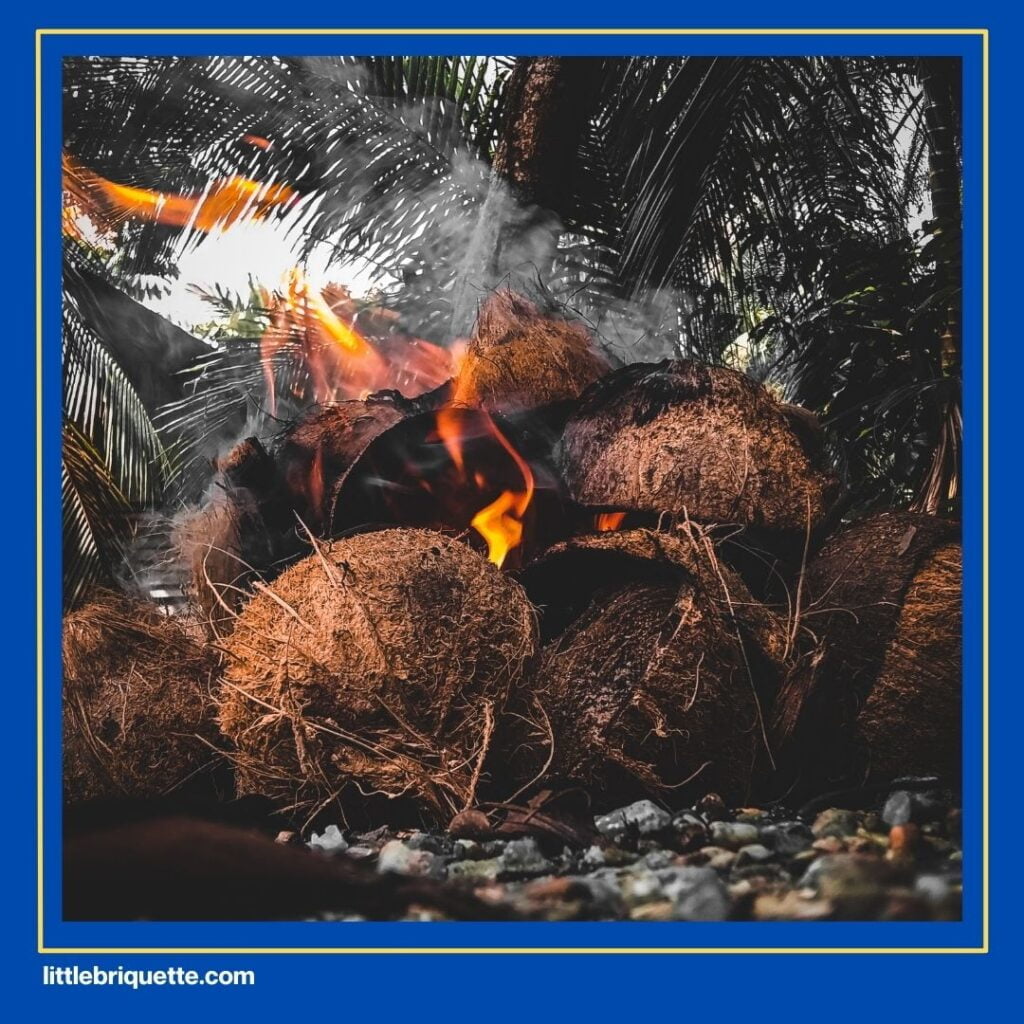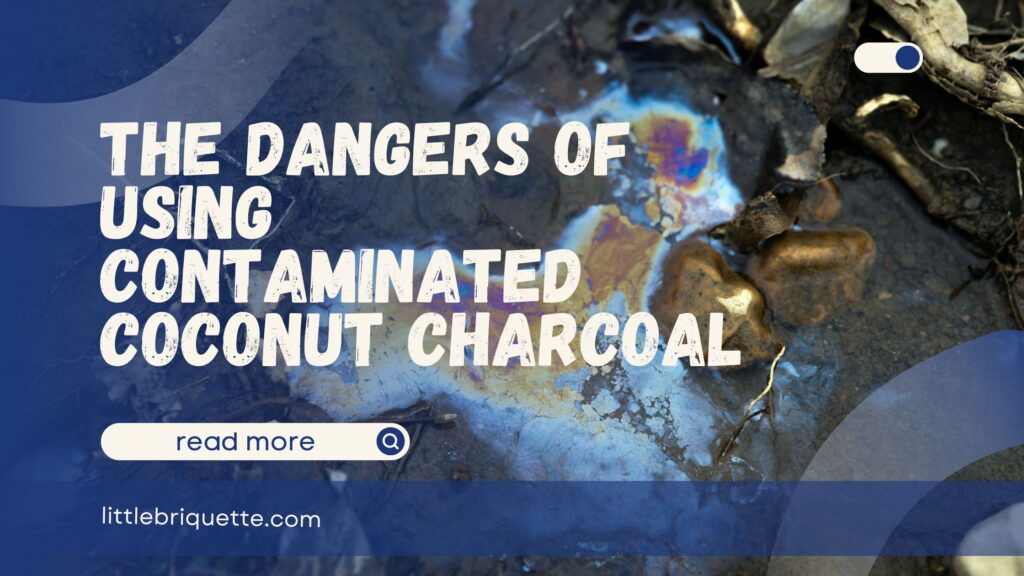Coconut charcoal has now become an alternative renewable fuel source that can be used for combustion processes as a substitute for wood charcoal. Charcoal made from coconut shells is considered more effective for use due to its numerous advantages over traditional charcoal. However, to achieve the best results when using coconut charcoal, its quality must be considered. Charcoal contaminated with chemicals can have detrimental effects when used or consumed. Therefore, it is important to understand the production of coconut charcoal without chemical contamination to avoid long-term risks.
Alternative Fuel Source from Coconut Shells
Coconut charcoal has garnered increasing interest as an environmentally friendly alternative fuel source in recent years. Its emergence as a sustainable alternative to traditional wood charcoal has drawn attention due to its renewability and potential for reducing carbon footprints. Coconut charcoal is produced from coconut shells burned at high temperatures to yield carbon. This process not only produces effective fuel for various purposes including cooking and heating but also utilizes abundant agricultural waste.
However, recent concerns have arisen regarding contamination of coconut charcoal by chemicals. Production processes that involve certain chemicals, such as accelerants for combustion or chemical binders, can result in contaminated coconut charcoal. This contamination poses a serious issue as it may compromise the safety and sustainability of using coconut charcoal as a fuel source. Additionally, chemical residues left in contaminated coconut charcoal can have negative health impacts when used for cooking or heating.
Therefore, it is crucial to explore methods for producing coconut charcoal that do not involve harmful chemicals, ensuring that the end product is clean, safe to use, and maintains the expected environmental benefits of coconut charcoal as an eco-friendly alternative fuel.
Manufacturing Production of Coconut Charcoal
The production of coconut charcoal can be carried out using two methods: traditional and modern. Below is a detailed explanation of the process to produce pure coconut charcoal without contamination.
Production of Coconut Charcoal with Traditional Method

The traditional method of coconut charcoal production typically involves direct burning of coconut shells using firewood or other fuels. This process can be conducted at various scales, from household to commercial levels. Here’s a brief explanation of the commonly used traditional method:
- Preparation of Raw Materials: Coconut shells are separated from their flesh and husks. The shells are then collected and prepared for the burning process.
- Burning: Coconut shells are placed in stacks or specialized racks and burned using firewood or other fuels. This process involves high temperatures to convert the coconut shells into charcoal.
- Carbonization Process: The burning process usually takes several hours to several days, depending on the scale and techniques used. During burning, carbonization occurs within the coconut shells, resulting in charcoal as the final product.
Although the traditional method of coconut charcoal production is straightforward and commonly practiced, there are risks of chemical contamination that need to be considered. The use of fuels such as firewood, which may be contaminated with chemicals like pesticides or other substances, can lead to contamination of the coconut charcoal as these hazardous substances can burn alongside the coconut shells and deposit in the resulting charcoal.
Furthermore, some producers use chemical binders to accelerate the burning process or enhance the quality of coconut charcoal, which can lead to contamination with unwanted chemical residues. Uncontrolled burning processes or the use of non-environmentally friendly fuels also have the potential to create air pollution and environmental contamination, affecting air quality around the coconut charcoal production site.
Modern Technology Without Chemical Contamination

The introduction of new technologies capable of producing coconut charcoal without chemical contamination has been a primary focus in efforts to enhance the safety and sustainability of coconut charcoal products. One modern approach that has been developed involves the use of specially designed temperature-controlled reactors.
In this method, coconut shells are placed into the reactor with tightly controlled temperature and atmospheric settings. During the carbonization process, the temperature and atmospheric conditions inside the reactor are carefully regulated to ensure that the coconut charcoal produced is free from harmful chemical residues. This technology not only enhances the safety of coconut charcoal for use in applications such as cooking and heating but also reduces negative environmental impacts by minimizing air pollution and environmental contamination associated with traditional open burning processes.
This modern approach represents a significant advancement in ensuring that coconut charcoal remains a clean and safe alternative fuel source, maintaining its expected environmental benefits.
The Dangers of Using Contaminated Coconut Charcoal
Coconut charcoal contaminated with chemicals poses serious risks to both the environment and human health. Using coconut charcoal containing hazardous substances such as binding agents or other chemicals can result in the emission of toxic gases when burned, threatening the quality of the air we breathe daily. Toxic gases like carbon monoxide and nitrogen dioxide can cause respiratory problems and even long-term health issues such as chronic lung diseases. Additionally, waste from the production of contaminated coconut charcoal can pollute surrounding soil and water, reducing agricultural productivity and endangering aquatic life as well as the health of humans consuming contaminated water.
To address these dangers, it is crucial to choose pure coconut charcoal produced in an environmentally friendly manner and free from harmful chemicals. Manufacturers who ensure that their coconut charcoal comes from reliable sources and utilize clean production processes can help reduce carbon footprint and maintain the air quality we breathe. Besides providing safety for everyday use, pure coconut charcoal also supports the balance of local ecosystems by reducing the risk of environmental pollution. By selecting the right products, we not only protect our own health but also contribute positively to global environmental sustainability.
The Benefits of Using Chemical-Free Coconut Charcoal
Coconut charcoal produced without chemical contamination offers several significant advantages, both environmentally and health-wise, and holds considerable market potential.
From an environmental standpoint, the use of pure coconut charcoal helps reduce carbon footprint due to cleaner and eco-friendly production processes. Production without harmful chemicals prevents environmental pollution that could occur from the burning of chemicals or binding agents. It also contributes to natural resource conservation by converting abundant agricultural waste into economically valuable products.
In terms of health, clean coconut charcoal ensures that there are no chemical residues that could threaten human health when used for cooking or heating. This is crucial because residues from contaminated coconut charcoal can be hazardous if inhaled or consumed in significant quantities.
Economically, the market for chemical-free coconut charcoal continues to grow alongside increasing awareness of environmental and health importance. Consumers are increasingly inclined to choose environmentally friendly and health-safe products. This provides opportunities for producers to market pure coconut charcoal as a better and sustainable choice in the global market.
Pure Coconut Charcoal Product
Obtaining pure coconut charcoal without contamination from harmful chemicals is a crucial factor that users must consider. This is because charcoal mixed with hazardous substances can have adverse effects on both the environment and the users’ health. But, there’s no need to worry because now Little Briquette offers pure coconut charcoal products produced from coconuts harvested in Sumatra. Get high-quality products by contacting this number.

